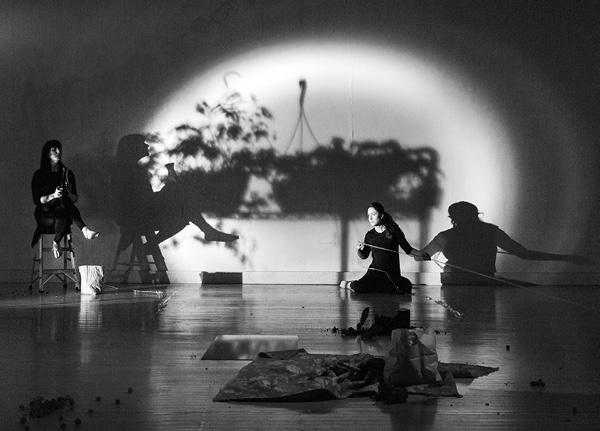
BETWEEN PARADISE AND A HARD PLACE
first performed on November 21, 2015
Links Hall, Chicago, IL
performed once in 2015
JOSHI RADIN / MARYAM TAGHAVI
Chicago, IL / Tehran, Iran / Toronto, Canada / Vancouver, Canada
858511272j858511272o858511272s858511272h858511272i858511272@858511272j858511272o858511272s858511272h858511272i858511272r858511272a858511272d858511272i858511272n858511272.858511272c858511272o858511272m858511272 858511272/858511272 858511272m858511272t858511272a858511272g858511272h858511272a858511272v858511272i858511272@858511272s858511272a858511272i858511272c858511272.858511272e858511272d858511272u
BETWEEN PARADISE AND A HARD PLACE
JOSHI RADIN / MARYAM TAGHAVI
Situated between a vision of paradise and an ascetic ideal, we play with tropes and absurdities of the promises of our respective spiritual and religious traditions. The performance field becomes a model, a challenge, and an escape from ideas that inspire the postponement of earthly pleasure, and those that encourage the renunciation of desire to overcome suffering.
Bringing Buddhist practices into conversation with Muslim visions of paradise echo cross-cultural traditions interfacing in a globalized context. We bring these histories into dialogue with each other, and present some difficulties that such an effort presents. While both traditions have personal resonance for us, they act on different registers of belief, practice, and the body. This project mirrors contemporary questions regarding religion and the body, the ethics of dying (both Islam and Buddhism have engaged in holy war), and the aesthetics of ritual.
The performance opens in darkness with a spoken drone. The content was the front page from a newspaper of record, not sutras, one week after the ISIS bombings in Paris. A screen comes on, I am shown making ritual hand gestures in the style of Buddhist mudras, but of my own invention. There is a mirror onstage, reflecting the light of the screen.
Maryam and I enter. She pushes a cart, covered with plants on top, while I am below. Following a traditional garden design, Maryam moves along a grid, coming to rest centerstage. An old-fashioned overhead projector comes on, casting a round yellow light onstage, an iridescent rainbow outlining the light. Maryam begins a monologue based on the life of her mouth. The mouth became a symbol of the decadence characteristic of paradise.
I scrub and clean the floor with a toothbrush.
Taking the mirror in her lap, Maryam gazes at her reflection and the audience, speaks a monologue, and, walking with the mirror, confronts and confuses the audience with mirror light play.
I do a prostration across the stage, licking the length of the floor. I read monologues, Maryam taunts me while eating sunflower seeds and grapes. Gradually the scene dissembles. Pulling on threads of tape, I follow a path to nowhere. She walks up a ladder to nowhere. Maryam chokes on water. A plant spills and breaks. The elements break down. We hurriedly gather our belongings and leave, but not before bringing the overhead projector into focus, revealing a simple sheet of yellow cellophane that masqueraded as our sun.